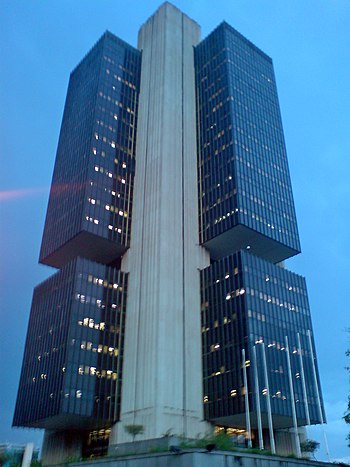The Business and Economics Portal Business is the practice of making one's living or making money by producing or buying and selling products (such as goods and services). It is also "any activity or enterprise entered into for profit." A business entity is not necessarily separate from the owner and the creditors can hold the owner liable for debts the business has acquired. The taxation system for businesses is different from that of the corporates. A business structure does not allow for corporate tax rates. The proprietor is personally taxed on all income from the business. A distinction is made in law and public offices between the term business and a company such as a corporation or cooperative. Colloquially, the terms are used interchangeably. (Full article...) Economics (/ˌɛkəˈnɒmɪks, ˌiːkə-/) is a social science that studies the production, distribution, and consumption of goods and services. Economics focuses on the behaviour and interactions of economic agents and how economies work. Microeconomics analyses what is viewed as basic elements within economies, including individual agents and markets, their interactions, and the outcomes of interactions. Individual agents may include, for example, households, firms, buyers, and sellers. Macroeconomics analyses economies as systems where production, distribution, consumption, savings, and investment expenditure interact, and factors affecting it: factors of production, such as labour, capital, land, and enterprise, inflation, economic growth, and public policies that have impact on these elements. It also seeks to analyse and describe the global economy. (Full article...) Selected articleTulip mania or tulipomania (Dutch names include: tulpenmanie, tulpomanie, tulpenwoede, tulpengekte and bollengekte) was a period in the Dutch Golden Age during which contract prices for bulbs of the recently introduced tulip reached extraordinarily high levels and then suddenly collapsed. At the peak of tulip mania, in March 1637, some single tulip bulbs sold for more than 10 times the annual income of a skilled craftsman. It is generally considered the first recorded speculative bubble (or economic bubble), although some researchers have noted that the Kipper- und Wipperzeit episode in 1619–22, a Europe-wide chain of debasement of the metal content of coins to fund warfare, featured mania-like similarities to a bubble. The term "tulip mania" is now often used metaphorically to refer to any large economic bubble (when asset prices deviate from intrinsic values). Selected image
Selected economyThe economy of the Netherlands is a highly developed market economy focused on trade and logistics, manufacturing, services, innovation and technology and sustainable and renewable energy. It is the world's 18th largest economy by nominal GDP and the 28th largest by purchasing power parity (PPP) and is the fifth largest economy in European Union by nominal GDP. It has the world's 11th highest per capita GDP (nominal) and the 13th highest per capita GDP (PPP) as of 2023 making it one of the highest earning nations in the world. Many of the world's largest tech companies are based in its capital Amsterdam or have established their European headquarters in the city, such as IBM, Microsoft, Google, Oracle, Cisco, Uber, Netflix and Tesla. Its second largest city Rotterdam is a major trade, logistics and economic center of the world and is Europe's largest seaport. Netherlands is ranked fifth on global innovation index and fourth on the Global Competitiveness Report. Among OECD nations, Netherlands has a highly efficient and strong social security system; social expenditure stood at roughly 25.3% of GDP. The Netherlands has a prosperous and open economy, which depends heavily on foreign trade. The economy is noted for stable industrial relations, fairly low unemployment and inflation, a sizable current account surplus (which, compared to the size of the country, is even more than Germany) and an important role as a European transportation hub; Rotterdam is the biggest port in Europe; and Amsterdam has one of the biggest airports in the world. Industrial activity is predominantly in food processing, chemicals, petroleum refining, high-tech, financial services, the creative sector and electrical machinery. Its highly mechanized agricultural sector employs no more than 2% of the labor force but provides large surpluses for the food-processing industry and for exports. The Netherlands, along with 11 of its EU partners, began circulating the euro currency on 1 January 2002. (Full article...) Selected quote"That is just what happened in 1893. Wall Street expected it and was ready with actual cash to buy in at nominal prices what the public was forced by the panic to sacrifice. The banks got their share of the plunder, the repeal of the silver purchasing clause, and increase of Govemtnent currency was stopped. But Wall Street had to wait for its share, the gold standard. The banks, however, were loyal to the conspiracy. They stood with Wall Street in the campaign of 1896, and on March 14, 1900, Wall Street and its foreign bond-holding clients got their share of the plunder, the adoption by Congress of the single gold standard. Writer is not hereby attacking the gold standard or advocating its repeal. That law is an accomplished fact. Nor is he favoring free and unlimited coinage of silver at sixteen to one. He is a republican, and never believed free silver coinage to be the proper remedy. But he is trying plainly to state without political bias certain historic facts and seemingly fair deductions of great significance because such facts have a most important bearing tending to reveal the true character and methods of the national banking system and Wall Street and throw a flood of needed light upon the present attempt of these interests to still further increase their profits and power at the expense of the people."
TopicsRelated WikiProjectsDid you know (auto-generated) -
On this day in business history
General imagesThe following are images from various business-related articles on Wikipedia.
More did you know
Business news
SubcategoriesRelated portals
Things you can doUrgent and important articles are bold
WikimediaThe following Wikimedia Foundation sister projects provide more on this subject:
SourcesDiscover Wikipedia using portals |







































